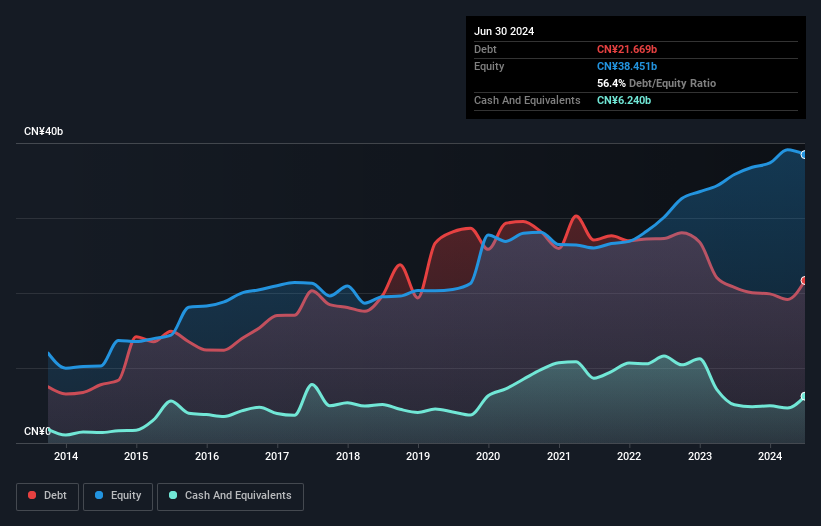- China
- /
- Oil and Gas
- /
- SHSE:601872
China Merchants Energy Shipping (SHSE:601872) Has A Pretty Healthy Balance Sheet

David Iben put it well when he said, 'Volatility is not a risk we care about. What we care about is avoiding the permanent loss of capital.' It's only natural to consider a company's balance sheet when you examine how risky it is, since debt is often involved when a business collapses. We note that China Merchants Energy Shipping Co., Ltd. (SHSE:601872) does have debt on its balance sheet. But is this debt a concern to shareholders?
When Is Debt A Problem?
Debt assists a business until the business has trouble paying it off, either with new capital or with free cash flow. Part and parcel of capitalism is the process of 'creative destruction' where failed businesses are mercilessly liquidated by their bankers. However, a more common (but still painful) scenario is that it has to raise new equity capital at a low price, thus permanently diluting shareholders. Of course, the upside of debt is that it often represents cheap capital, especially when it replaces dilution in a company with the ability to reinvest at high rates of return. When we examine debt levels, we first consider both cash and debt levels, together.
View our latest analysis for China Merchants Energy Shipping
How Much Debt Does China Merchants Energy Shipping Carry?
As you can see below, at the end of June 2024, China Merchants Energy Shipping had CN¥21.7b of debt, up from CN¥20.8b a year ago. Click the image for more detail. However, it also had CN¥6.24b in cash, and so its net debt is CN¥15.4b.

How Healthy Is China Merchants Energy Shipping's Balance Sheet?
According to the last reported balance sheet, China Merchants Energy Shipping had liabilities of CN¥16.6b due within 12 months, and liabilities of CN¥12.3b due beyond 12 months. Offsetting these obligations, it had cash of CN¥6.24b as well as receivables valued at CN¥4.39b due within 12 months. So its liabilities outweigh the sum of its cash and (near-term) receivables by CN¥18.2b.
China Merchants Energy Shipping has a market capitalization of CN¥53.3b, so it could very likely raise cash to ameliorate its balance sheet, if the need arose. But it's clear that we should definitely closely examine whether it can manage its debt without dilution.
We use two main ratios to inform us about debt levels relative to earnings. The first is net debt divided by earnings before interest, tax, depreciation, and amortization (EBITDA), while the second is how many times its earnings before interest and tax (EBIT) covers its interest expense (or its interest cover, for short). Thus we consider debt relative to earnings both with and without depreciation and amortization expenses.
China Merchants Energy Shipping's net debt is sitting at a very reasonable 2.0 times its EBITDA, while its EBIT covered its interest expense just 5.5 times last year. While these numbers do not alarm us, it's worth noting that the cost of the company's debt is having a real impact. Notably China Merchants Energy Shipping's EBIT was pretty flat over the last year. Ideally it can diminish its debt load by kick-starting earnings growth. There's no doubt that we learn most about debt from the balance sheet. But it is future earnings, more than anything, that will determine China Merchants Energy Shipping's ability to maintain a healthy balance sheet going forward. So if you want to see what the professionals think, you might find this free report on analyst profit forecasts to be interesting.
But our final consideration is also important, because a company cannot pay debt with paper profits; it needs cold hard cash. So we clearly need to look at whether that EBIT is leading to corresponding free cash flow. During the last three years, China Merchants Energy Shipping produced sturdy free cash flow equating to 71% of its EBIT, about what we'd expect. This cold hard cash means it can reduce its debt when it wants to.
Our View
On our analysis China Merchants Energy Shipping's conversion of EBIT to free cash flow should signal that it won't have too much trouble with its debt. But the other factors we noted above weren't so encouraging. For instance it seems like it has to struggle a bit to grow its EBIT. When we consider all the elements mentioned above, it seems to us that China Merchants Energy Shipping is managing its debt quite well. Having said that, the load is sufficiently heavy that we would recommend any shareholders keep a close eye on it. The balance sheet is clearly the area to focus on when you are analysing debt. But ultimately, every company can contain risks that exist outside of the balance sheet. These risks can be hard to spot. Every company has them, and we've spotted 2 warning signs for China Merchants Energy Shipping you should know about.
When all is said and done, sometimes its easier to focus on companies that don't even need debt. Readers can access a list of growth stocks with zero net debt 100% free, right now.
If you're looking to trade China Merchants Energy Shipping, open an account with the lowest-cost platform trusted by professionals, Interactive Brokers.
With clients in over 200 countries and territories, and access to 160 markets, IBKR lets you trade stocks, options, futures, forex, bonds and funds from a single integrated account.
Enjoy no hidden fees, no account minimums, and FX conversion rates as low as 0.03%, far better than what most brokers offer.
Sponsored ContentNew: AI Stock Screener & Alerts
Our new AI Stock Screener scans the market every day to uncover opportunities.
• Dividend Powerhouses (3%+ Yield)
• Undervalued Small Caps with Insider Buying
• High growth Tech and AI Companies
Or build your own from over 50 metrics.
Have feedback on this article? Concerned about the content? Get in touch with us directly. Alternatively, email editorial-team (at) simplywallst.com.
This article by Simply Wall St is general in nature. We provide commentary based on historical data and analyst forecasts only using an unbiased methodology and our articles are not intended to be financial advice. It does not constitute a recommendation to buy or sell any stock, and does not take account of your objectives, or your financial situation. We aim to bring you long-term focused analysis driven by fundamental data. Note that our analysis may not factor in the latest price-sensitive company announcements or qualitative material. Simply Wall St has no position in any stocks mentioned.
About SHSE:601872
China Merchants Energy Shipping
China Merchants Energy Shipping Co., Ltd.
Undervalued average dividend payer.
Market Insights
Community Narratives



